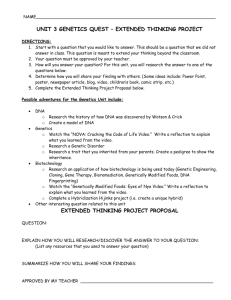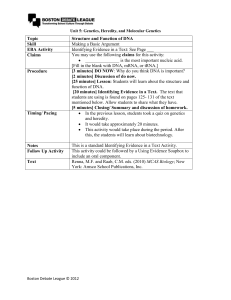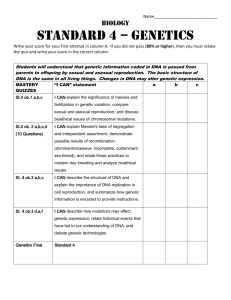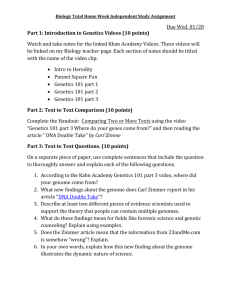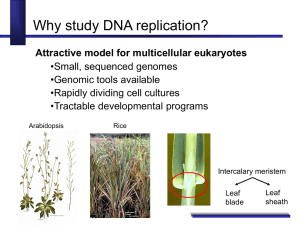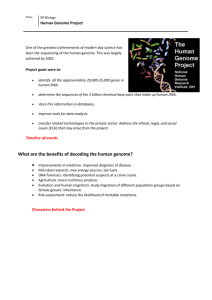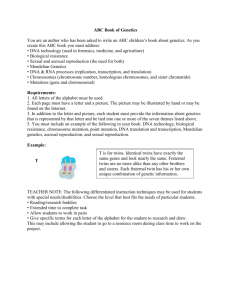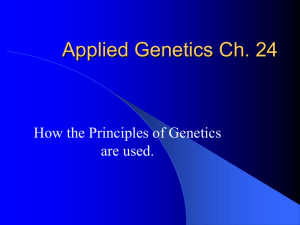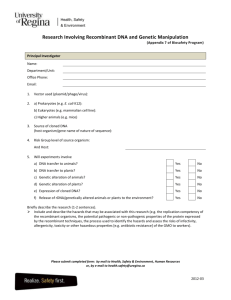sldnablogsyllabus-3 - EdBlogs
advertisement
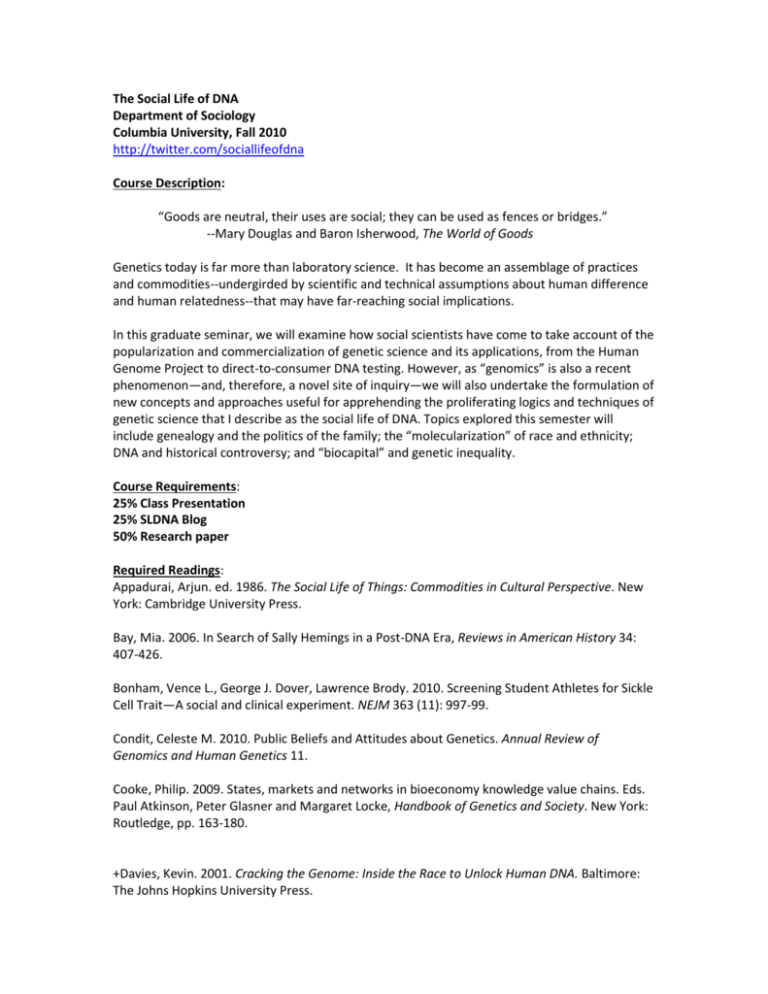
The Social Life of DNA Department of Sociology Columbia University, Fall 2010 http://twitter.com/sociallifeofdna Course Description: “Goods are neutral, their uses are social; they can be used as fences or bridges.” --Mary Douglas and Baron Isherwood, The World of Goods Genetics today is far more than laboratory science. It has become an assemblage of practices and commodities--undergirded by scientific and technical assumptions about human difference and human relatedness--that may have far-reaching social implications. In this graduate seminar, we will examine how social scientists have come to take account of the popularization and commercialization of genetic science and its applications, from the Human Genome Project to direct-to-consumer DNA testing. However, as “genomics” is also a recent phenomenon—and, therefore, a novel site of inquiry—we will also undertake the formulation of new concepts and approaches useful for apprehending the proliferating logics and techniques of genetic science that I describe as the social life of DNA. Topics explored this semester will include genealogy and the politics of the family; the “molecularization” of race and ethnicity; DNA and historical controversy; and “biocapital” and genetic inequality. Course Requirements: 25% Class Presentation 25% SLDNA Blog 50% Research paper Required Readings: Appadurai, Arjun. ed. 1986. The Social Life of Things: Commodities in Cultural Perspective. New York: Cambridge University Press. Bay, Mia. 2006. In Search of Sally Hemings in a Post-DNA Era, Reviews in American History 34: 407-426. Bonham, Vence L., George J. Dover, Lawrence Brody. 2010. Screening Student Athletes for Sickle Cell Trait—A social and clinical experiment. NEJM 363 (11): 997-99. Condit, Celeste M. 2010. Public Beliefs and Attitudes about Genetics. Annual Review of Genomics and Human Genetics 11. Cooke, Philip. 2009. States, markets and networks in bioeconomy knowledge value chains. Eds. Paul Atkinson, Peter Glasner and Margaret Locke, Handbook of Genetics and Society. New York: Routledge, pp. 163-180. +Davies, Kevin. 2001. Cracking the Genome: Inside the Race to Unlock Human DNA. Baltimore: The Johns Hopkins University Press. Douglas, Mary and Baron Isherwood 1996 [1979]. The World of Goods: Towards an Anthropology of Consumption. New York: Routledge. +Duster, Troy. 2003 [1990]. Backdoor to Eugenics. 2nd Edition. New York: Routledge. Foster, Eugene A., Mark A. Jobling, P.G. Taylor, et al. “Jefferson fathered slave's last child,” Nature 396: 27-28. Fortun, Michael A. 2008. Promising Genomics: Iceland and deCODE in a World of Speculation. Berkeley: University of California Press. Gordon-Reed, Annette. 1997. Thomas Jefferson and Sally Hemings: An American Controversy. Charlottesville: University Press of Virginia. Harmon, Amy. 2008. Gene Map Becomes a Luxury Item. The New York Times, March 4. Hogarth, Stuart, Gail Javitt and David Melzer. 2008. The Current Landscape for Direct-toConsumer Genetic Testing: Legal, Ethical, and Policy Issues. Annual Review of Genomics and Human Genetics 9. Joiner, Clinton and Mary Frederickson. 2010. Genetic screening in NCAA has potential to be discriminatory. Cincinnati Enquirer, September 9. +Kevles, Daniel J. and Leroy Hood, eds. 1992. The Code of Codes: Scientific and Social Issues in the Human Genome Project. Cambridge: Harvard University Press. +Koenig, Barbra, Sandra Soo-Jin Lee and Sarah Richardson, eds. 2008. Revisiting Race in a Genomic Age. New Brunswick: Rutgers University Press. Latour, Bruno. 2005. Reassembling the Social: An Introduction to Actor-Network-Theory. New York: Oxford. Lazer, David. Ed. 2004. DNA and the Criminal Justice System: The Technology of Justice. Cambridge, MA: MIT Press. Lynch, Michael and Ruth McNally. 2009. Forensic DNA Databases and biolegality: the coproduction of law, surveillance technology and suspect bodies. Eds. Paul Atkinson, Peter Glasner and Margaret Locke, Handbook of Genetics and Society. New York: Routledge, pp. 283-301. M’Charek, Amade. 2000. Technologies of Population: Forensic DNA Testing Practices and the Making of Differences and Similarities. Configurations 8: 121-158. McKinnon, Susan and Sarah Franklin, eds. 2002. Relative Values: Reconfiguring Kinship Studies. Durham: Duke University Press. Murphy, Erin. 2009. Relative Doubt: Familial Search of DNA Databases. SSRN Working paper. 2 +Nelkin, Dorothy and M. Susan Lindee. 2004 [1996 ] The DNA Mystique: The Gene as a Cultural Icon. Ann Arbor: University of Michigan Press. Nelson, Alondra. 2008. Bio Science: Genetic Genealogy Testing and the Pursuit of African Ancestry. Social Studies of Science 38: 759-783. Ossorio, Pilar and Troy Duster. 2005. Race and Genetics: Controversies in Biomedical, Behavioral, and Forensic Sciences. American Psychologist 60 (January): 115-128. Povinelli, Elizabeth. 2002. “Notes on Gridlock: Genealogy, Intimacy, Sexuality,” Public Culture 14: 215-238. +Rajan, Kaushik Sunder. 2006. Biocapital: The Constitution of Postgenomic Life. Durham, NC: Duke University Press. +Reardon, Jenny. 2005. Race to the Finish: Identity and Governance and an Age of Genomics. Princeton, NJ: Princeton University Press. +Reilly, Philip, R. 2000. Abraham Lincoln’s DNA and Other Adventures in Genetics. Cold Spring Harbor, NY: Cold Spring Harbor Laboratory Press. +Rose, Nikolas. 2007. The Politics of Life Itself. Princeto, NJ: Princeton University Press. +Wailoo, Keith and Stephen Pemberton. 2006. The Troubled Dream of Genetic Medicine. Baltimore: The Johns Hopkins University Press. Whooley, Owen. 2008. Objectivity and its Discontents: Knowledge Advocacy in the Sally Hemings Controversy. Social Forces 86: 1367-1389. Course Schedule: September 13—Introduction: The Social Life of DNA Nelkin and Lindee, The DNA Mystique Condit, “Public Attitudes and Beliefs About Genetics” September 20—The Social Life of Objects and Things Appadurai, excerpt from The Social Life of Things, p. 3-36. Douglas and Isherwood, The World of Goods, Preface, Introduction and p. 3-10; 36-66. Harmon, “Gene Map Becomes a Luxury Item,” New York Times Hogarth, Javitt and Melzer, “The Current Landscape for Direct-to-Consumer Genetic Testing” Latour, Reassembling the Social, p. 1-20, 63-86, 159-262. September 27—The Human Genome Project Davies, Cracking the Genome Kevles and Hood, The Code of Codes, chapters 1, 9-13 October 4—The Human Genome Diversity Project Reardon, Race to the Finish 3 October 11—Society and Genetics Rose, The Politics of Life Itself October 18—Race and Genetics = Eugenics? Duster, Backdoor to Eugenics Joiner & Frederickson, “Genetic screening in NCAA has potential to be discriminatory” Bonham et al. “Screening Student Athletes for Sickle Cell Trait” October 25—Race, Ethnicity and Personalized Medicine Wailoo and Pemberton, The Troubled Dream of Genetic Medicine Ossorio and Duster, “Race and Genetics: Controversies in Biomedical, Behavioral, and Forensic Sciences” November 1—No class November 8—Biocapital Rajan, Biocapital. Cooke, “States, markets and networks in bioeconomy knowledge value chains” November 15—Forensics Genetics and Criminal Law Lazer, DNA and the Criminal Justice System, p. 3-13, 23-90, 315-356. Lynch and McNally, “Forensic DNA Databases and biolegality: the co-production of law, surveillance technology and suspect bodies” M’Charek, “Technologies of Population” Murphy, “Relative Doubt: Familial Search of DNA Databases” November 22—Family, Kinship and Relatedness Nelson, “Bio Science” McKinnon and Franklin, Relative Values, p. 277-328, 355-383 Povinelli, “Notes on Gridlock” Foster, et al. “Jefferson fathered slave's last child,” Nature Gordon-Reed, “Authors Note,” Thomas Jefferson and Sally Hemings, vii-xiv. Whooley, Objectivity and Its Discontents, Social Forces Bay, In Search of Sally Hemings in the Post-DNA Era, Reviews in American History November 29—DNA and New Racial Formations? Koenig, et al., Revisiting Race in a Genomics Age December 6—DNA and the Unsettled Past Reilly, Abraham Lincoln’s DNA and Other Adventures in Genetics December 13—Case Study: Iceland/DeCode Fortun, Promising Genomics, ch. 1-3, X, 12, 13, 18, 20-22 View “Jar City” OR read novel Jar City: A Reykjavik Thriller by Arnaldur Indridason December 20—Final Research Paper Due 4
